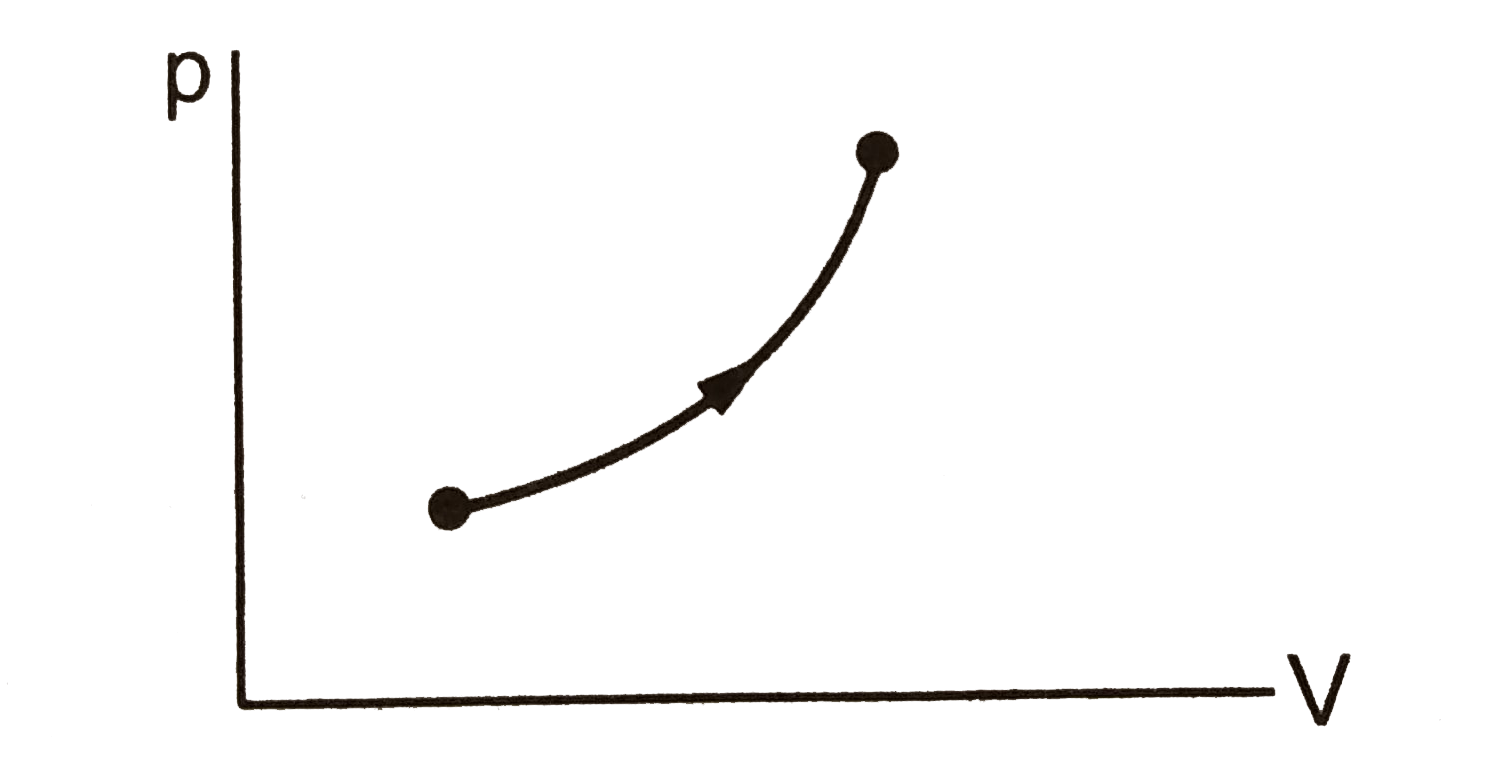For the same rise in temperature of one mole of gas at constant volume , heat required for a non - linear tratomic gas is K times that required for monoatomic gas . The value of K is
1
0.5
2
2.5
The correct Answer is:C
To solve the problem, we need to determine the value of K, which represents the ratio of heat required for a non-linear triatomic gas to that required for a monoatomic gas at constant volume for the same rise in temperature.
1. Understanding the Problem:
We have one mole of gas at constant volume, and we want to find the heat required (Q) for both monoatomic and triatomic gases when the temperature is raised by the same amount (ΔT).
2. First Law of Thermodynamics:
According to the first law of thermodynamics, the heat added to the system (Q) is equal to the change in internal energy (ΔU) plus the work done (W):
Q=ΔU+W
Since the volume is constant, the work done (W) is zero. Therefore:
Q=ΔU
3. Change in Internal Energy:
The change in internal energy for one mole of gas can be expressed as:
ΔU=nCvΔT
where n is the number of moles, Cv is the molar heat capacity at constant volume, and ΔT is the change in temperature.
4. Heat for Monoatomic Gas:
For a monoatomic gas, the molar heat capacity at constant volume Cv,mono is given by:
Cv,mono=32R
Therefore, the heat required for the monoatomic gas (Q_M) is:
QM=nCv,monoΔT=1⋅32RΔT=32RΔT
5. Heat for Triatomic Gas:
For a non-linear triatomic gas, the molar heat capacity at constant volume Cv,tri is given by:
Cv,tri=3R
Therefore, the heat required for the triatomic gas (Q_T) is:
QT=nCv,triΔT=1⋅3RΔT=3RΔT
6. Finding the Ratio K:
We know that:
QT=K⋅QM
Substituting the expressions for QT and QM:
3RΔT=K⋅(32RΔT)
Dividing both sides by RΔT (assuming RΔT≠0):
3=K⋅32
Solving for K:
K=332=2
7. Conclusion:
The value of K is 2.
Final Answer:
K = 2
We have one mole of gas at constant volume, and we want to find the heat required (Q) for both monoatomic and triatomic gases when the temperature is raised by the same amount (ΔT).
According to the first law of thermodynamics, the heat added to the system (Q) is equal to the change in internal energy (ΔU) plus the work done (W):
Q=ΔU+W
Since the volume is constant, the work done (W) is zero. Therefore:
Q=ΔU
The change in internal energy for one mole of gas can be expressed as:
ΔU=nCvΔT
where n is the number of moles, Cv is the molar heat capacity at constant volume, and ΔT is the change in temperature.
For a monoatomic gas, the molar heat capacity at constant volume Cv,mono is given by:
Cv,mono=32R
Therefore, the heat required for the monoatomic gas (Q_M) is:
QM=nCv,monoΔT=1⋅32RΔT=32RΔT
For a non-linear triatomic gas, the molar heat capacity at constant volume Cv,tri is given by:
Cv,tri=3R
Therefore, the heat required for the triatomic gas (Q_T) is:
QT=nCv,triΔT=1⋅3RΔT=3RΔT
We know that:
QT=K⋅QM
Substituting the expressions for QT and QM:
3RΔT=K⋅(32RΔT)
Dividing both sides by RΔT (assuming RΔT≠0):
3=K⋅32
Solving for K:
K=332=2
The value of K is 2.
K = 2
Similar Questions
The molar specific heat at constant volume, for a non linear triatomic gas is
View SolutionThe ratio of the specific heat at constant pressure to that at constant volume is larger for a diatomic gas than for a monoatomic gas.
View Solution70 calories of heat is required to raise the temperature of 2 mole of an ideal gas at constant pressure from 30^@C to 35^@C . The amount of heat required to raise the temperature of the same gas through the same range at constant volume is

View Solution70 calories of heat required to raise the temperature of 2 moles of an ideal gas at constant pressure from 30∘C→35∘C. The amount of heat required (in calories) to raise the temperature of the same gas through the same range (30∘C→35∘C) at constant volume is:
View Solution70 calories of heat required to raise the temperature of 2 moles of an ideal gas at constant pressure from 30∘C→35∘C. The amount of heat required (in calories) to raise the temperature of the same gas through the same range (30∘C→35∘C) at constant volume is:
View Solution70 calories of heat required to raise the temperature of 2 moles of an ideal gas at constant pressure from 30∘C→35∘C. The amount of heat required (in calories) to raise the temperature of the same gas through the same range (30∘C→35∘C) at constant volume is:
View Solution70 calories of heat is required to raise the temperature of 2 mole of an ideal gas at constant pressure from 30∘C to 35∘C . The amount of heat required to raise the temperature of the same gas through the same range at constant volume is

View Solution90 calories of heat is required to raise the temperature of 3 moles of an ideal gas at constant pressure from 30oC to 35oC. The amount of heat required in calories to raise the temperature of the gas through the range (50oC to 55oC) at constant volume is: (γ= Cp/Cv =1.4)
View Solution75 calories of heat is required to raise the temperature of 3 moles of an ideal gas at constant pressure from 30oC to 35oC. The amount of heat required in calories to raise the temperature of the gas through the range (50oC to 55oC) at constant volume is: (γ= Cv/Cp =1.4)
View Solution105 calories of heat is required to raise the temperature of 3 moles of an ideaol gas at constant pressure from30∘C to 35∘C. The amount of heat required in calories to raise the temperature of the gas though the range (60∘C to 65∘C) at constant volume is (γ=CpCv=1.4)
View Solution
